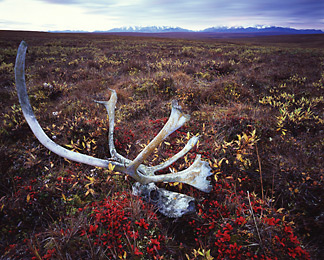New Arctic exhibit comes on eve of Cornell's two-year-old pact with Paleontological Research Institution
By Krishna Ramanujan

As the Paleontological Research Institution (PRI) ends its second year of formal affiliation with Cornell, a new large-format photography exhibit of the natural beauty and the fragility of Alaska's Arctic slope is to be featured at the institution's Museum of the Earth.
The exhibit, "The Place Where Life Begins: Endangered Landscapes of the Arctic National Wildlife Refuge," by Rolfe Radcliffe and Robin Radcliffe, will run Nov. 4 to Dec. 17.
The steady flow of such museum exhibits, educational programs and PRI-sponsored events -- as witness "Darwin Days," last year's symposium on evolution -- has been enriched by the Nov. 20, 2004, agreement between Cornell and the institution. The agreement does not involve a merger or a financial tie between the two entities but is a mutually beneficial connection.
"The affiliation gave a formal stamp of approval to an already existing relationship," said PRI Director Warren Allmon. That relationship includes PRI's taking over Cornell's entire nonbotanical fossil collection, such events as "Darwin Days," Allmon's position as an adjunct professor in the Department of Earth and Atmospheric Sciences, graduate students conducting research through the institution and geology students whom Allmon advises.
And a required undergraduate evolution course for biology majors uses the museum's exhibits as a teaching tool. "Every biology major at Cornell comes through here," said Allmon.
Cornell Cooperative Extension (CCE) also has a growing partnership with PRI through its statewide 4-H program. While PRI's reach extends beyond Tompkins County via the 4-H connection, youth in Tompkins and other counties benefit from the use and loan of fossils for lessons, PRI-developed earth science curricula and by visiting the museum to engage in earth science exhibits.
"That's the collaboration right now, and we hope that it's going to grow," said Helene Dillard, director of CCE, associate dean in the College of Human Ecology and the College of Agriculture and Life Sciences, professor of plant pathology and a member of PRI's board of trustees.
In addition, the Department of Earth and Atmospheric Sciences has "built PRI into our department's future plans," said Teresa Jordan, that department's chair and also a PRI board member. "And the affiliation has grown … which means greater involvement of Cornell students in hands-on learning experiences that could be achieved through PRI's collections and by using the institution as a training ground for educating the public."
Part of the PRI-Cornell pact was that Cornell's president could nominate at least 20 percent of the members to PRI's board of trustees. Currently, close to 60 percent of the 24 trustees are either Cornell employees or alumni.
PRI has an operating budget of $1.6 million; one-quarter of those funds come from museum tickets, events and gift shop revenues; about a third comes from grants that fund educational outreach programs; and the rest stems from individual donations.
Media Contact
Get Cornell news delivered right to your inbox.
Subscribe